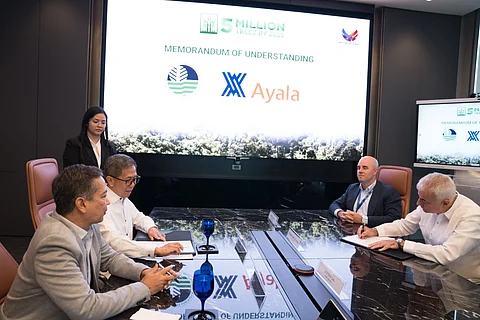
- NEWS
- the EDIT
- COMMENTARY
- BUSINESS
- LIFE
- SHOW
- ACTION
- GLOBAL GOALS
- SNAPS
- DYARYO TIRADA
- MORE

The Department of Environment and Natural Resources (DENR) is urging private companies to take an active role in forest restoration efforts, emphasizing that reforestation can deliver both environmental benefits and economic returns through carbon credits.
During the signing of a Memorandum of Understanding (MOU) with the Ayala Group of Companies under the Forests for Life: 5 Million Trees by 2028 program, DENR Secretary Raphael P.M. Lotilla emphasized the economic potential of sustainable forest management.
“Are we going to simply see ourselves as producers of carbon credits? Can we take a look at how we can catch or capture part of the value added?” Lotilla asked, challenging businesses to go beyond compliance and explore value creation in the growing carbon market.
The MOU targets the planting of at least five million native forest trees across critical watershed areas in Ilocos Norte, Bataan, Rizal, Leyte, Bukidnon, and Lanao del Norte over the next three years. The initiative also ensures survival and maintenance of planted trees, with the ultimate goal of generating high-integrity carbon credits.
“We need not be part of the regional hub,” Lotilla said. “We can see whether there is money to be made in being a hub, not only for the region, but also globally.”
As the government works to refine its carbon trading policies and frameworks, Lotilla called for stronger collaboration between public and private sectors. “Together, we are not simply planting trees, but motivating a future – one where our forests thrive and our stakeholders live in a healthy, prosperous, and resilient society,” he said.
With the MOU signing, the Ayala Group—composed of Ayala Corporation, Ayala Land, Bank of the Philippine Islands, Globe Telecom, and ACEN—reaffirmed its commitment to the reforestation program, which it initially joined during the International Day of Forests last March 21. The group now joins 21 other organizations in the program’s official partner registry.
Under the agreement, partners are responsible for site preparation, seedling production, tree planting, and ongoing maintenance of the reforested areas. Additional contributions can include community engagement, educational campaigns, and use of proprietary technologies or resources.
The DENR, through its Forest Management Bureau and regional offices, will designate reforestation sites and offer technical support, permitting assistance, and regulatory compliance guidance. It will also oversee tree survival monitoring, carbon sequestration tracking, and maintain a transparent partner registry.
Participation in the Forests for Life program offers companies potential sustainability certifications, tax incentives, employee engagement opportunities, and public recognition in environmental platforms.
The program incorporates advanced technologies such as satellite and drone monitoring, carbon tracking, and data-driven strategies to ensure accountability and verifiable impact. It prioritizes native tree species and long-term forest protection in ecologically critical areas, especially watersheds, supporting national climate resilience and international environmental commitments.
